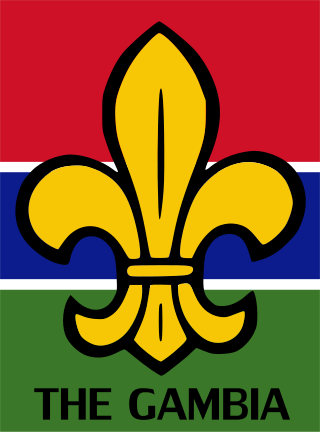The Senegambia is, in the narrow sense, a historical name for a geographical region in West Africa, which lies between the Senegal River in the north and the Gambia River in the south. However, there are also text sources which state that Senegambia is understood in a broader sense and equated with the term the Western region. This refers to the coastal areas between Senegal and Sierra Leone, where the inland border in the east was not further defined.
Alhaji Bai Konte (1920–1983) was a jali from Brikama, Gambia. His father, Burama Konte, composed the anthem of the 19th century Senegambian hero Mansumaneh Yundum, Yundum N'ko. It was from that piece that the anthems of Sheriff Sidi Hydara and Nyansu Mbasse originated. Burama Konteh was a well-known kora player of his generation. Bai Konte was a regular on Radio Gambia and Radio Senegal's joint program called Chossani Senegambia in the 1970s. He and other griots such as Jali Nyama Suso and Alhaji Abdoulaye Samba used to play live music during the show. Bai Konteh had narrated many epics on that show including the epic of King Abdou Njie and his griot and advisor Ibra Faye. Prominent broadcasters of that show included Alhaji Alieu Ebrima Cham Joof, Alhaji Assan Njie and Alhaji Mansour Njie.

The talking drum is an hourglass-shaped drum from West Africa, whose pitch can be regulated to mimic the tone and prosody of human speech. It has two drumheads connected by leather tension cords, which allow the player to change the pitch of the drum by scraping the cords between their arm and body.

The Gambia Scout Association, the national scouting organization of the Gambia, was founded in 1921, and became a member of the World Organization of the Scout Movement in 1984.
Radiodiffusion Télévision Sénégalaise (RTS) is the Senegalese public broadcasting company.
The Serer people are a West African ethnoreligious group. They are the third-largest ethnic group in Senegal, making up 15% of the Senegalese population. They are also found in northern Gambia and southern Mauritania.
The Daily Observer is a newspaper published in Bakau in Banjul, the Gambia.
The Democratic Party was a political party in the Gambia. The party was founded during the pre-independence period in the colony of Bathurst. Ahead of the 1962 general elections, the DP merged with the Muslim Congress Party to form the Democratic Congress Alliance. In 1960, Alieu Ebrima Cham Joof who has been one of the original members was elected at its Social Secretary.
The Bathurst Trade Union (BTU) was the first trade union in The Gambia and the first legally registered trade union in the African continent. Founded by Edward Francis Small in 1929 in Bathurst, the organisation emerged from the Carpenters' and Shipwrights' Society.
Laba Badara Sosseh; Labba Sosseh or Laba Sosseh was a Senegalese son and salsa singer and composer. According to Abdoulaye Saine of Miami University, Sosseh is regarded as "the greatest salsa singer of his generation and perhaps of all time in Senegambia Major."
Edward Francis Small was a Gambian statesman who has been described as the "trailblazer of Gambian political consciousness." One of the few educated Africans in the Gambia Colony and Protectorate during the early 20th century, Small founded the country's first trade union, the country's first political party, and was the first citizen elected to its legislature. He was also a delegate to and leader of the National Congress of British West Africa (NCBWA).
Joof, is a typical Serer patronym in the Gambia. In French-speaking Senegal, it is written as Diouf, whilst in English-speaking Gambia, it is written as Joof. It is the surname of:
The Gambia Radio & Television Service is the national broadcaster of the West African state of the Gambia. Gambia Radio & Television Service currently broadcasts in English and native local languages.

Alieu Ebrima Cham Joof commonly known as Cham Joof or Alhaji Cham Joof, was a Gambian historian, politician, author, trade unionist, broadcaster, radio programme director, scout master, Pan-Africanist, lecturer, columnist, activist and an African nationalist who advocated for the Gambia's independence during the colonial era.

Joof or Diouf is a surname that is typically Serer. This surname is also spelt Juuf or Juf.
This is a timeline of the history and development of Serer religion and the Serer people of Senegal, The Gambia and Mauritania. This timeline merely gives an overview of their history, consisting of calibrated archaeological discoveries in Serer countries, Serer religion, politics, royalty, etc. Dates are given according to the Common Era. For a background to these events, see Roog, Serer religion, Serer creation myth, Serer prehistory, Lamane, States headed by Serer Lamanes, Serer history and Serer people.
Alhaji Bai Modi Joof was a barrister at law from the Gambia, practicing from the mid-1970s to 1993, the year he died. Also known as Alhaji B.M. Joof, B.M. Joof or Lawyer Joof, he was a member of the UK and Gambian Bar, and a barrister and solicitor of the Gambian Supreme Court. He was termed the "champion of free speech" by some quarters of the Gambian press during the administration of president Sir Dawda Kairaba Jawara. He was a defense-barrister and came from a Wolof and Serer background of the family Joof. He is not to be confused with his former protégé, Joseph Henry Joof, who is also commonly referred to as Lawyer Joof.
Tamsier Joof Aviance or Tamsier Aviance is a British dancer, choreographer, actor, model, entrepreneur, radio presenter, and author. He took the name "Aviance" after joining the House of Aviance — one of the legendary vogue-ball houses in the United States. As well as appearing in several musicals, and as stage backing dancer for Mary Kiani, Take That and Janet Jackson, he was also known within the London voguing scene during the 1990s and is among the original London vogue dancers of that era.
Marie Samuel Njie was a musician and singer, from, and popular in, The Gambia.



